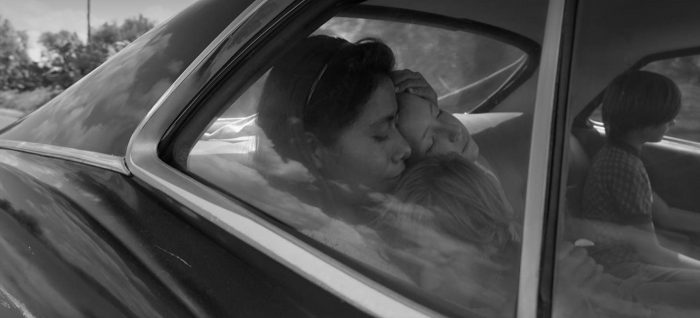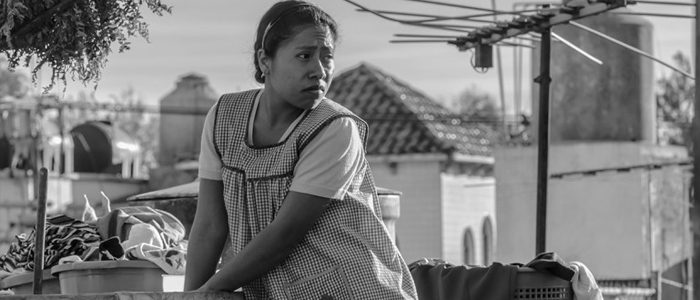Alfonso Cuarón's 'Roma' Is A Netflix Movie That Deserves To Be Seen In Cinemas [NYFF]
Alfonso Cuarón's Gravity just isn't the same on television. One might say this works to its detriment — "story is king," I was reminded in film school as a professor lamented its bells & whistles — but if an artistic experience is designed for a specific environment, should it not be given the benefit of doubt? The enveloping sound of Cuarón's 2013 space-thriller is dread-inducing, a precursor to the pulsating rebirth of hope within the heart of infinite darkness; in an age when even ostensibly "good" blockbusters feel produced by committee, Gravity was one of the last times a film simply had to be experienced in a cinema, in that it could not be experienced the same way outside it. It's fitting, then, that Cuarón's own Roma belongs in that sparsely populated category, albeit for different reasons.
Roma is a Netflix release, yes, but if the streaming giant's theatrical rollout finds its way to your vicinity, you owe yourself the unique experience of sitting down in a seat in order to walk through someone else's memory. It's like nothing you've ever heard or seen.
Set in the early '70s in Mexico City, Roma is based partially on Cuarón's own childhood. It centers the experiences and perspective of indigenous household maid Cleo (Yalitza Aparicio), as she manages the drama in her own life — a sudden pregnancy, on which the father walks out — while also having to manage the fallout of her employer's affair. Antonio and Sofia (Fernando Grediaga and Marina de Tavira), a well-to-do couple of European descent who are on the verge of divorce, live in a large house in Colonia Roma with their four children, Pepe (Marco Graf), Sofi (Daniela Demesa), Paco (Carlos Peralta) and Toño (Diego Cortina Autrey) and Sofia's mother Teresa (Verónica García). The class conflict in the film, if one can call it a conflict at all — perhaps "immovable backdrop" is more accurate — is a silent one, passively relegated to the margins of Cuarón's as-is retelling of time and place, if not factual chronology.
The family's love for Cleo, and her love for the children, exist side-by-side with her employee status, but the story doesn't seek to challenge this seeming normality, at least not directly. If anything, it hopes to explore memories in vivid detail, allowing the innocence (and perhaps, naiveté) of Cuarón's childhood stand-ins, Pepe, Sofi and Fermín, to exist in conjunction with his now adult perspective, as he empathizes by retroactively engaging with the complexity of a status quo that once seemed simple. In short, Roma is a story of motherhood, complicated by socio-economic boundaries, yet filled to the brim with tragic love. And its telling, which seeks to leave behind Cuarón's shoes and step slowly into Cleo's, is simply masterful.

Cuarón, acting as his own cinematographer, situates us in moments from his childhood with stunning detail. The visual-effects virtuoso, now working at his most subtle in decades, uses his precise timing to draw us into this world by presenting a plane overhead, off in the distance, as we see the sky reflected in soapy water being swept around like a tide. It's a soothing image to be sure, but the water is meant to clean up dog shit on the family's driveway. The gap between those who can afford to fly and those who pick up after them becomes apparent before we see a single human face.
As the children run around and play on the rooftop, and as Cleo cleans their clothes nearby, each crack in each wall around them feels ready to inspect. Neither 3D nor Virtual Reality are likely pull one into a world that way Roma does simply by pushing its contrast; every element of costume and set design feels tangible. Even in black & white, the film's rich visual texture (owed to an insistence on deep focus and wide lenses, even in moments of intimate drama, capturing as much detail as possible on the ALEXA 65) creates a living, breathing tapestry. It connects the characters to the world around them as off-screen sounds, from voices, to birds, to dogs, to the hustle & bustle of nearby markets echo from the rear speakers, connecting us to the world, and the characters, too. The theatrical sound mix is impeccable, extending the life on screen to all corners of the cinema, and it isn't long before this chamber of sound, projecting familiar ambience from behind u, as if from the recesses of our own minds, fits us into the story like a puzzle piece.
The film is even precise in its captioning, using text to tell its own story. The only two subtitled languages on screen are Spanish and Mixtec, despite English and other European dialects showing up on occasion. The relationship between the two tongues enters the spotlight whenever they're spoken in close proximity. The live-in maids and the family both speak Spanish, but only the maids speak Mixtec [presented in block brackets, as if being protected from its colonial counterpart], rendering it the only secrecy or privacy they have in the family's wide-open home.

In one moment, Cleo is the children's surrogate mother in Sofia's absence. In the next, she's an outlet for Sofia's rage now that Antonio has left her. There is however, by design, no coherent sense of transition between these two kinds of scenes, but for the whim of Cleo's employers. Sometimes she's treated with scorn, sometimes with tenderness, and neither she nor the audience can be certain of which response she'll get. Both these kinds of interactions are shot with the same trepidation — from afar, enveloped by the vast spaces of the family mansion — as if Cuarón himself is uncertain which is which.
This uncanny restraint is Cuarón cinematic apologia; Cleo has no say in what her role in the family will be on a given day, so the visual perspective of each scene is guided not by her action, but by helpless inaction, her stillness and resilience allowed linger amidst the emptiness. Cleo is at once a resident of the mansion and a fixture of it, often framed at the bottom of its staircase, limited by its expanse. What narrative agency she is afforded, however, comes in the form of silent moments, in which Aparicio fights to maintain her composure, speaking volumes by saying little and doing even littler. By having invited us into this space, Cuarón renders us equally helpless, unable to reach out and comfort Cleo, or correct Sofia, or explain this complication to the children, despite all of them feeling within our grasp. Instead we, like Cuarón, are left to wrestle with a past we cannot change.
In a scene where everyone in the house is watching TV together, we're first situated in the space between the characters and the screen, facing the images, watching them on the floor in front of the family, as we absorb their reactions from behind us. What we hear is their laughter, in unison, comforting and familiar, but when Cuarón cuts to show us Cleo and the family (now situating the innocent, on-screen images far behind us), what we see is the family on the couch, with Cleo knelt on the floor beside them, enjoying the programme despite her position. Before moving on to the next scene, we catch a brief glimpse of this image in its totality, captured from a distant vantage — perhaps a contemplative corner. The family, the screen, Cleo on the floor, all from a rear view; a newly finished diorama, as if the relationship between three shots has moved us from childhood ignorance, to the sudden realization of Cleo's reality, to being able to look back on the full picture as adults.

As Cuarón moves back in time, he reverts to the intimate focus of his Y Tu Mamá También days, though the lessons he learned on Harry Potter and the Prisoner of Azkaban and Children of Men are readily apparent. The political unrest in the film's peripheries, which eventually explodes and envelopes Cleo and the family, comes to us in the form of uncontrollable waves of people; the main characters are but prisoners to these larger forces of history, events Cuarón has no ability to change. Marches and riots and all-out violence invade the film's pristine visual texture, masses of dirty grey bringing chaos into the frame just when it seems like Cleo, now pregnant and being cared for by the family, has fewer worries.
The chaotic chorus of yelling and gunshots shatters the auditory dreamscape, bringing, once again, a sense of enveloping dread to the proceedings (Without getting into spoiler territory, flaming trees and enormous waves have much the same effect, invading what otherwise feels like a calming ASMR experience). Cuarón only ever wields the combination of close-up, shallow focus and subjective framing for the most hard-hitting emotional moments, which arrive well into the film's 135-minute runtime. They stand out in the process, and that they result from the film itself being upheaved by violent madness makes them all the more devastating, replacing the kind of haunting string notes one often hears juxtaposed with a booming orchestra (Roma has no musical score; it doesn't need one).
Any attempt to return to normalcy once the characters have been put through the wringer — physically, mentally and emotionally — is met with refusal. Ocean waves no longer feel calm after trauma has infected the family dynamics. Crowds begin to feel invasive, even in the distance (Sofia and the children contemplate their future without Antonio as a wedding goes on behind them, in a particularly affecting scene that makes even joy feel like a momentary intrusion). Even Cleo's idea of motherhood becomes complicated when being mother becomes entangled with her job, a confusing sensation that permeates the film as the soundscape loses clarity.
I have to wonder if all these subtle details, from the feel of the walls to the children's voices echoing at the end of the hallways, will play the same way on TV. They inform, at once, the space which Cleo inhabits and the open heart with which she inhabits it. We're used to cinematic memory being hazy, but the clarity with which Cuarón articulates these far-off experiences feels akin to building a home for Cleo, as he begins to understand the sacrifices of motherhood and the unsung heroes of his youth; a fitting cinematic tribute to one of the women who raised him, and the clarity with which he now sees her.
How touching, then, that Cleo's reward on her day off is a trip to the cinema.
Alfonso Cuarón's special guest to the #NYFF Centerpiece premiere is his real-life nanny, joined by star Yalitza Aparicio, who plays the nanny in ROMA. pic.twitter.com/AksoubcYJ4
— New York Film Festival (@TheNYFF) October 5, 2018
